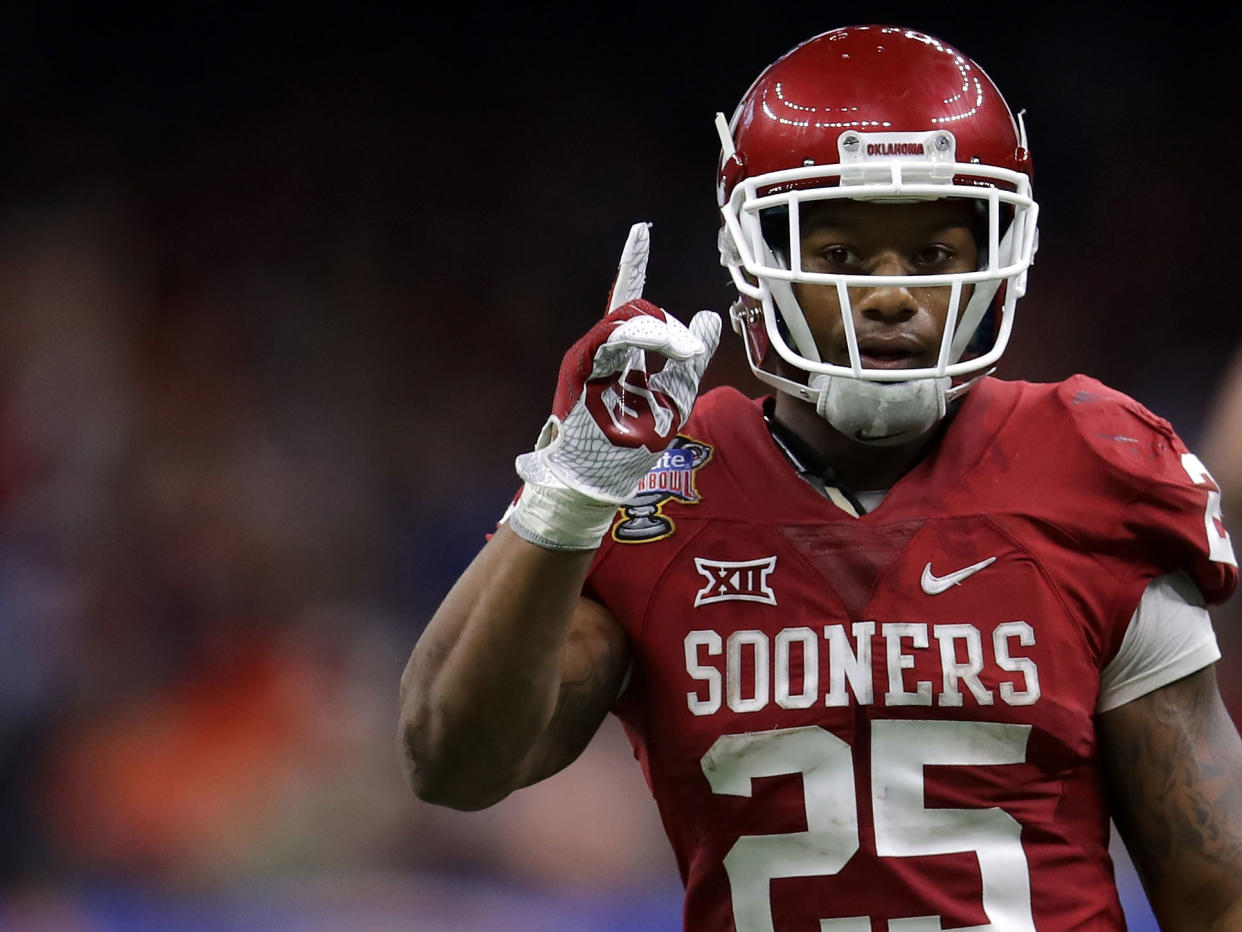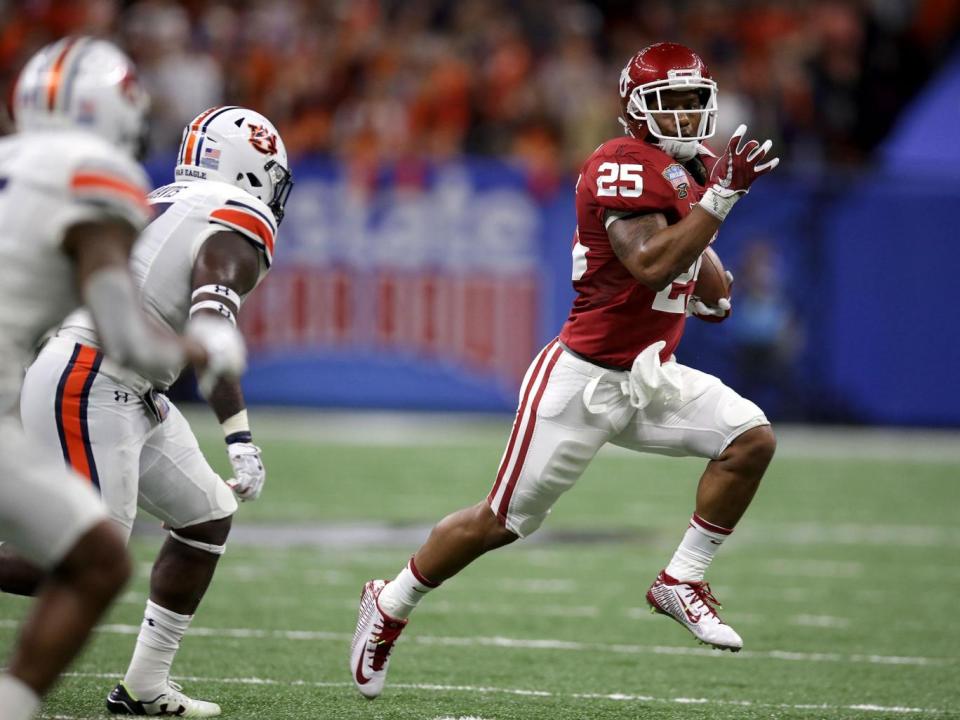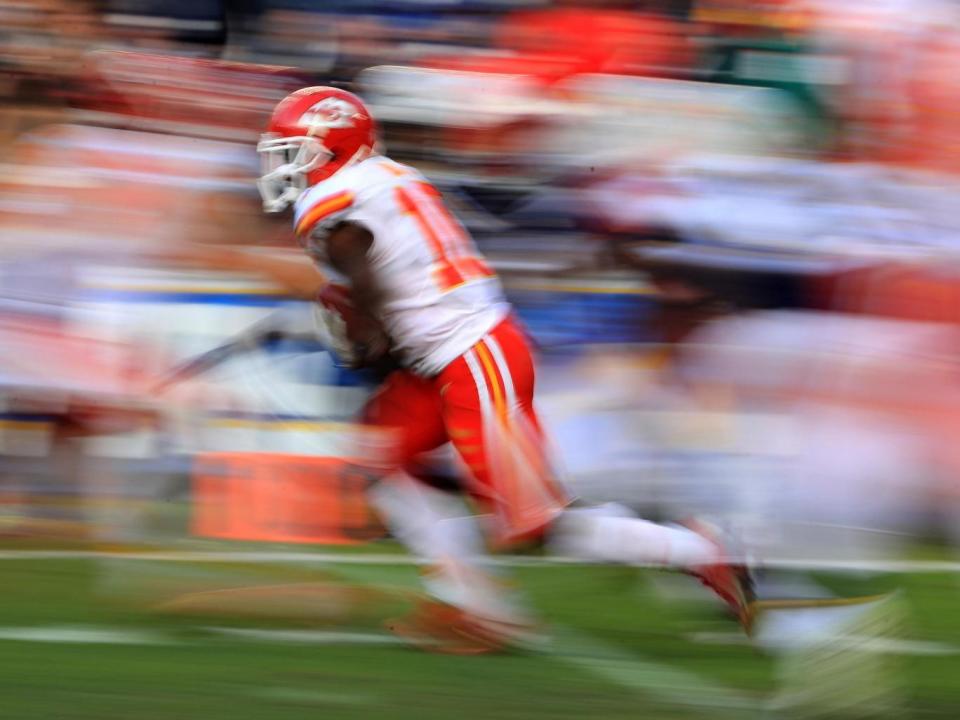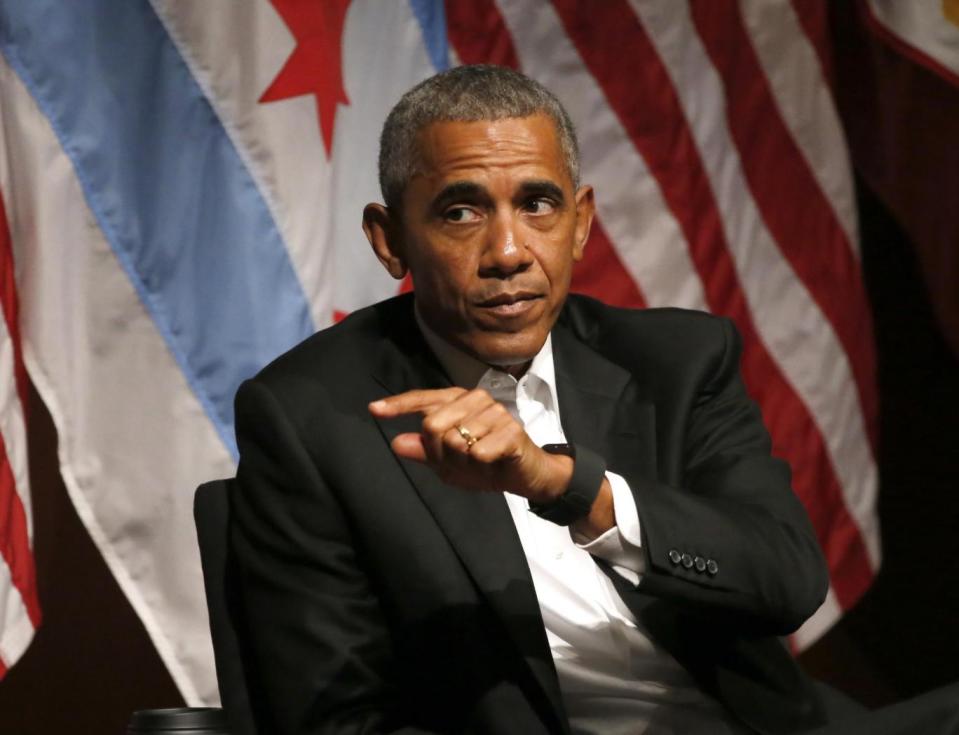NFL draft 2017: Joe Mixon's entry highlights the sport's confused relationship with domestic violence

It was just one punch, but when it came it was delivered with such brutal force that it knocked Amelia Molitor clean off her feet. As she fell, her head slammed into the table she’d been leaning against only seconds before. Rushed to a local hospital, she would undergo eight hours of surgery to repair four fractures in her cheekbone and a broken jaw which had to be wired shut. She’d lose the feeling in one side of her face for almost six months.
Molitor had been on a night out with friends which ended with a stop at Pickleman’s Gourmet Cafe, a nondescript eatery stuck between a small Italian restaurant and a women’s clothing boutique in Norman, Oklahoma. It’s a popular spot, known for staying open long after the bars have closed. CCTV shows the group chatting as a young black man enters and walks towards them, stopping beside their table. He says something - Molitor would tell police that it was a homosexual slur - and she turns furiously and shoves the man, who lunges back at her. She slaps him and instantly he knocks her out with a devastating right hook.
Friends rush to help Molitor as she lays motionless, her wedge heels are the only thing visible to the cameras. [Editor's note: while the video is easily found online, we won't be embedding it here]
Finally she’s helped to her feet but collapses again before being picked up by two friends whilst a third tries to stem the bleeding from her face. The attacker has long since left. He was inside Pickleman’s for just 23 seconds; the video from that night in July 2014 shows him turn and casually walk out into the street, looking back just once at the scene he’d created. He’d later tell police that he was “shocked that she hit me so hard. It felt like a dude hit me.” Both victim and perpetrator attend the University of Oklahoma: she’s a 20 year old dual-degree student whose dream is to set up an organisation to help abused women and children abroad. He’s one of the most ballyhooed football recruits in the school’s history, feted for his athletic ability. He is Joe Mixon and he’s about to become the NFL’s latest moral dilemma.

On Thursday night the NFL Draft takes place in Philadelphia, where the league’s thirty-two teams pick the best 253 players from the college ranks, providing not only the best source of player recruitment but also offering a means of parity: one good draft can turn a moribund franchise into a winner, a bad one can send a team into free-fall and those who consistently draft well, win.
Given the volume of players to choose from - a survey last month by the NCAA reported that 16,369 students who played college football in 2016 are eligible to be selected - and the money spent on them when they sign their contracts; last year’s 1st overall pick Jared Goff received a 4 year, $27.9 million dollar deal - teams have to be certain what they’re getting. Which is why Joe Mixon is such a conundrum.
A California high school phenomenon, he’s an athletic freak of nature; chiselled at 6’0 and 228lbs, he runs forty yards - the NFL’s testing distance for speed - in a remarkable 4.38 seconds. On pure talent alone he’s arguably the best running back in the class and a top 15 player overall. But he won’t be selected in the top 15 because which team wants a domestic abuser as the face of their future?
Which owner’s going to feel comfortable selling a player to his fanbase that broke a woman’s face and for almost three years showed little remorse for doing so? A number of teams have already intimated they won’t draft him. But someone will.

After his arrest Mixon entered a plea, acknowledging there was enough evidence to convict him of misdemeanour assault while still asserting his innocence; he claimed that one of Molitor’s party had used a racial slur against him. He didn’t serve any jail time and was ordered to perform 100 hours of community service.
The University of Oklahoma suspended him for the 2014 season, although head coach Bob Stoops subsequently said, albeit after a national outcry, that his punishment wasn’t enough. However, since then, apart from a parking ticket, he’s been the model student athlete and has recently begun to talk openly about the incident after initially refusing to publicly apologise.
Last month he told Albert Breer of The MMQB that what people saw on camera wasn’t representative of the real Joe Mixon. “I’d never gotten into trouble before, and never after. You can’t judge someone on a mistake they made. I’m sure you’ve made mistakes. It’s what you do after and what you learn from it.” He has a point. But aside from his contrition, however late in coming, the NFL doesn’t want him celebrated - they banned him from attending their five day pre-draft testing event in Indianapolis - and they certainly don’t want him anywhere near the opening night of the draft, a glitzy, red carpet affair that goes out in prime time and is easily the biggest televised non-sporting sporting event on the planet. If Mixon’s name is one of 32 called in that first round, it will be a public relations disaster for the NFL.
And yet this underlines their staggering hypocrisy over domestic violence.

Three time league MVP Jim Brown is one of the greatest players in NFL history. He’s also a man who’s been accused of and investigated for, beating or raping women at least six times over several decades, including throwing his then girlfriend from a second floor balcony.
Yet in 2013 his former team, the Cleveland Browns brought him back as a special adviser. When asked about his new role in light of his treatment of women, they responded by saying that his “experience and perspective, especially with the valued benefit of time, can positively impact our organisation as we continue to evolve.” In other words, we don’t want to talk about it. But Brown’s behaviour, and the reaction of the team isn’t an isolated incident; Hall of Fame quarterback Warren Moon was arrested in 1995 after attacking his wife, but upon retirement the NFL’s own television company made a documentary celebrating his life.
When Miami Dolphin tight end Randy McMichael was arrested for aggravated battery of a pregnant woman, the response of his coach, Nick Saban was, “I’m not running the Father Flanagan boys’ home.” McMichael was never suspended by the Dolphins and the NFL fined him one week’s pay. Current NFL superstars Brandon Marshall and Terrell Suggs have multiple domestic violence arrests on their rap sheets, but continue to thrive in the game. Marshall too has had his own NFL Network special.

And only last year, Tyreek Hill transformed the Kansas City Chiefs season and propelled them to the playoffs, becoming arguably the most explosive player in all of football. He was voted to the NFL All Star game despite having been arrested and charged with domestic abuse by strangulation and, according to the police report, throwing his girlfriend to the ground “like a rag doll”, then sitting on top of her, punching her in the stomach. She was eight weeks pregnant.
Unlike Mixon however, neither Hill or any of the 17 other NFL players arrested for domestic violence since Mixon’s arrest in the summer of 2014 were filmed in the act.
Perhaps the case with the most similarities to that of Mixon is Ray Rice’s. A week after the start of the 2014/15 season, the website TMZ released a video showing the Baltimore Ravens star knocking his then fiancee Janay Palmer unconscious in an Atlantic City casino lift. It shocked America, consuming the news cycle for weeks as demands grew for Rice to be removed from the team and the league. However, NFL commissioner Roger Goodell chose to suspend the running back for just two games, drawing understandable criticism. What could have been a watershed moment instead became a missed opportunity, in part because the league seemed more worried about protecting a star athlete than about the welfare of women.

The reputation of the NFL was in the gutter. Even President Obama decreed that the league appeared to be “behind the curve” when it came to dealing with violence against women. Goodell responded by introducing a new policy in which any employee found to have engaged in domestic violence or battery would be suspended without pay for six games. But the inexcusable fact with pro football is that winning is everything, no matter the crimes of the individual.
Former Chicago Bears general manager Jerry Angelo admitted as much in the aftermath of the Rice video, telling USA Today that teams didn’t discipline players in "hundreds and hundreds" of domestic violence incidents during his 30 years in the league. “My typical approach was to inquire, ‘OK, is everybody OK? Yeah. How are they doing? Good’. And then we'd just move on. We'd move on.” Fellow GM Steve Keim of the Arizona Cardinals once told reporters, when asked to about off-field issues for college prospects entering the league, “If Hannibal Lecter ran a 4.3 forty, we’d probably diagnose it as an eating disorder.” His comment was in jest, but you get the point. If the reward is great enough, then to hell with the risk because if you can help us win, we’ll give you chance after chance after chance.

As legendary NFL writer Peter King told The Independent: "The league is putting a lot of emphasis on it now but they are clearly on the side of giving guys one more chance.
"They would’ve been willing to give Ray Rice another chance in the league if someone had signed him but nobody did.
"That’s why Mixon is such an interesting case.
"The NFL is like anybody else in any walk of life – what do you do with someone who has committed a heinous act. Do you bar him forever, do you allow him to go back? That’s the big question the NFL are trying to answer and it’s not easy. It’s up to the individual teams – someone is going to take him and then it’s about what kind of programme you’re going to put in place."
Most analysts agree he won’t be taken in the first round next Thursday, but should come off the board early in the second. A bargain in NFL terms, but a millstone for the team who selects him. He’ll forever be remembered for a dreadful split-second moment that changed two people’s lives forever. But should he be punished for the rest of his life for something that he did in that moment of madness, less than 24 hours after his 18th birthday? As he himself says, doesn’t everyone deserve a second chance? Perhaps.

As King adds, "there could be five, 10, 15 owners who tell their coach ‘we’re not taking this guy, we’re not taking a chance. The act that he committed is too reprehensible’. There will be some owners who say ‘we’re not taking him. Period.’
"If you pick him you better have a plan, not just for now but for the next two or three years. You’re going to have to have people inside your organisation who make sure he’s living the right way.
"It comes down to a personal decision, a personal choice that you have to make. If you’re not comfortable with him that’s totally fine – there are going to be a lot of people who are not comfortable with him. I believe he’ll get taken in either round two or three – his talent is inescapable."
His place in the league will undoubtedly be questioned but given the NFL’s checkered history around domestic violence, he’ll ultimately be judged on performances and that makes fandom hard to reconcile in an America that seems to have taken a retrograde step in its treatment of women. Sports Illustrated’s Joan Niesen summed it up perfectly in a recent editorial for the magazine: “We don’t have high horses anymore, not in a sport where abuse happens on nearly every team, and certainly in every season. All we have is the truth: that a man hit a woman, that he was sheltered and punished lightly. Joe Mixon broke a woman’s jaw. Joe Mixon got a second chance. He doesn’t have to be a villain forever, but he’s certainly not a highlight-reel hero.”
Amelia Molitor grew up an Oklahoma football fan and has attended many of their games at the 86,000 seater Owen Field alongside her parents who are season ticket holders. But she’s not been back since that night in 2014. After all, it’s hard to cheer for a team that included the man that broke your jaw. It’s unlikely that she’ll watch next week’s draft to see which franchise will turn her attacker into an instant millionaire. But more and more, siding with Molitor over sport seems the right thing to do. Because at what point do you just stop cheering?

 Yahoo News
Yahoo News 
